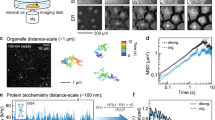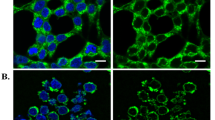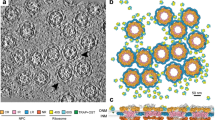Abstract
A RECENT investigation of the osmotic properties of the nucleus in intact frog oocytes has indicated that the nuclear membrane of these cells is not freely permeable to large molecules (mol. wt. 40,000 or greater)1. The present investigation was carried out in order to determine whether or not similar results could be obtained for oocytes of an unrelated species.
This is a preview of subscription content, access via your institution
Access options
Subscribe to this journal
Receive 51 print issues and online access
$199.00 per year
only $3.90 per issue
Buy this article
- Purchase on Springer Link
- Instant access to full article PDF
Prices may be subject to local taxes which are calculated during checkout
Similar content being viewed by others
References
Harding, C. V., and Feldherr, C. M., J. Gen. Physiol., 42, 1155 (1959).
Stern, H., and Mirsky, A. E., J. Gen. Physiol., 37, 177 (1953).
Author information
Authors and Affiliations
Rights and permissions
About this article
Cite this article
FELDHERR, C., FELDHERR, A. The Nuclear Membrane as a Barrier to the Free Diffusion of Proteins. Nature 185, 250–251 (1960). https://doi.org/10.1038/185250a0
Issue Date:
DOI: https://doi.org/10.1038/185250a0
This article is cited by
-
HIV-1 Accessory Protein Vpr: Relevance in the pathogenesis of HIV and potential for therapeutic intervention
Retrovirology (2011)
-
Nuclear envelope permeability
Nature (1975)
-
�ber den Transport zelleigener Makromolek�le durch die Kernmembran
Chromosoma (1965)
Comments
By submitting a comment you agree to abide by our Terms and Community Guidelines. If you find something abusive or that does not comply with our terms or guidelines please flag it as inappropriate.



